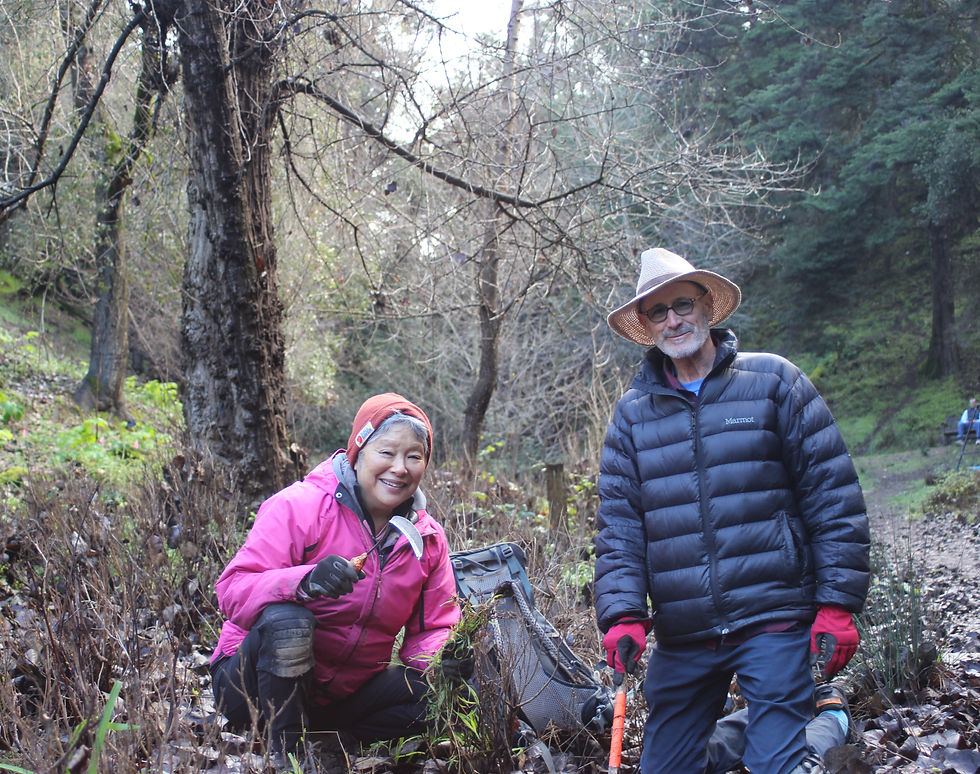Friend of the Month | Ebube Okereke
- Friends of Sausal Creek
- Aug 8, 2025
- 3 min read

Meet Ebube, an Eagle Scout from Scout Troop 202, who recently refurbished five benches for the FOSC native plant nursery for her Eagle project.
Ebube’s project upgraded the nursery benches by replacing old wooden tops with weatherproof, drainable surfaces and reinforcing rotted footings with pressure-treated wood. These improvements make the benches more durable and easier to clean—reducing the risk of disease among the thousands of native plants grown each year for restoration.
FOSC: What inspired you to choose FOSC for your Eagle Scout project?
Ebube: Joaquin Miller Park has played a big role in my life. As a kid, I attended summer camps and after-school programs in the surrounding area. During COVID, I would go on walks there to clear my head. Joaquin Miller Park is the meeting point for my troop before our out-of-town outings, so it’s always felt like a second home.
I had seen other Eagle projects at the park and even at the Friends of Sausal Creek nursery itself. It was only natural that when it came time for my Eagle project, I would reach out to FOSC because I wanted to give back to this park which has been a big part of my growing up in Oakland.
I was excited to learn that help was needed with refurbishing the planter tables, benches, and picnic tables. This was a perfect fit, as I had recently grown interested in building through a stagecraft class where I helped build sets for school plays over the past four years. This project combined my love for the outdoors with my new passion for hands-on construction—culminating in a project that helps preserve the environment around us.
FOSC: What did you learn from the process of leading the project and refurbishing the benches?
Ebube: The most important thing I learned in this process is that one must be able to adapt easily. During my project, I had a few hiccups that I didn’t anticipate, so I had to come up with solutions on the fly.
I also learned the importance of time management. While I was working on this project, I was also working on college applications, doing many extracurriculars, and making sure that I was staying on top of my classes at school. I had to organize my schedule to be efficient and productive without burning out. I kept to my schedule very strictly to ensure my goals were met in a timely manner, allowing me to finish the project on time.
FOSC: Was there anything unexpected or especially rewarding about the project?
Ebube: Seeing the project that I had planned for months come together was the most rewarding part. Leading up to project day, I was a bit anxious about how the day would go, but seeing my fellow scouts and the troop adults work together in a fun-filled atmosphere to produce gorgeous-looking planter tables and picnic tables was gratifying.
Another rewarding thing was seeing all the people who gave up their weekend to be there. It made me feel very special to know that all those people were there for me and wanted to see me succeed. It reaffirmed my faith in my scouting community.
FOSC: Why do you think restoration work like this is important?
Ebube: Restoration work like the kind FOSC does is very important because it helps reverse the damage caused by humans, improving biodiversity and the overall health of ecosystems.
FOSC: What’s next for you—are there other projects or environmental efforts you’re excited about or interested in for the future?
Ebube: Right now, I don’t have any projects in mind, however I am still very interested in the preservation of our earth.
I want to explore the connection between health and climate/environment. I want to be an advocate for health and the earth. As I head off to college in the fall, I plan to join conservation, restoration, and climate advocacy clubs, and when I come back during breaks, I hope to be back at the nursery to volunteer.


